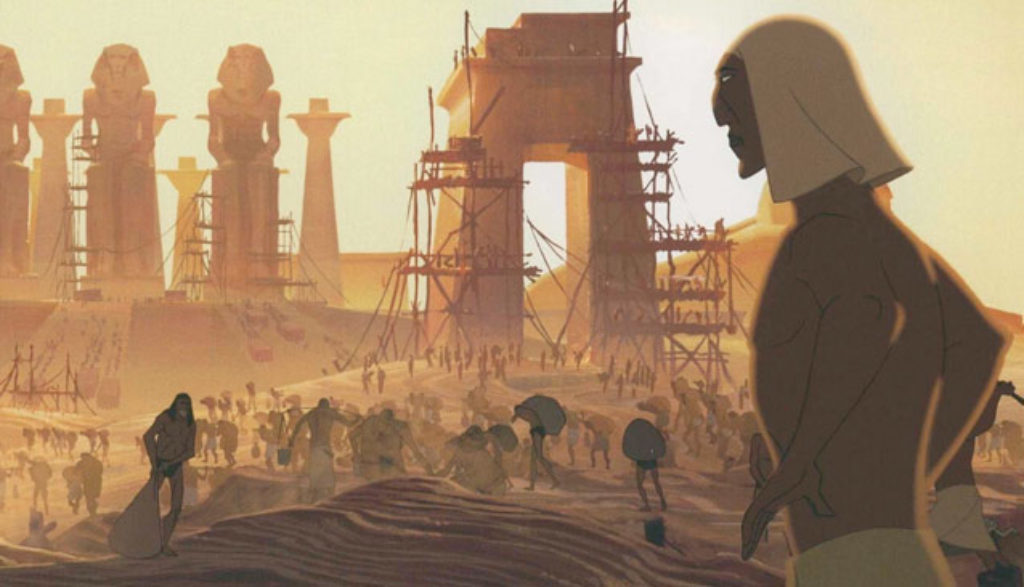
The “Disney Renaissance” of the late 1980s and early 1990s pushed the boundaries of animation by taking the formulas of Broadway musicals, applying them to fairy tales, and selling the results to grown-ups who might never have considered going to a Disney cartoon. So when Jeffrey Katzenberg, the chief architect of that “Renaissance”, teamed up with Steven Spielberg and David Geffen to create a new movie studio, DreamWorks SKG, he was determined to make an animated film that would go even further in expanding the range of what was possible in the medium.
Spielberg suggested that they produce a remake of The Ten Commandments – the biblical story of Moses and the liberation of the Israelites from their bondage in Egypt – and one of the first people Katzenberg turned to for creative input was Stephen Schwartz, a tunesmith who had worked for Katzenberg on Disney’s Pocahontas and The Hunchback of Notre Dame but had also written musical adaptations of the teachings of Jesus (Godspell) and the early chapters of Genesis (Children of Eden).
The resulting film was The Prince of Egypt – and before any visual or narrative development had begun on the film, Schwartz wrote the opening song, ‘Deliver Us’, which establishes in seven minutes the enslavement of the Hebrews, Moses’ adoption by Pharaoh’s wife, and Miriam’s hope that he might save their people one day. The song set the tone for all that followed: the epic scale, the ethnic sensitivity (the melody was inspired by Arab pop songs and the lyrics are partly in Hebrew), the foregrounding of the film’s female characters, and the seriousness with which it would tackle the story’s religious themes. (No wisecracking genies or talking animals here.)
While the other songs occasionally veer toward the banal (‘All I Ever Wanted’, as Moses resists the first hints of his destiny) or the comical (‘Playing with the Big Boys’, in which Steve Martin and Martin Short play Pharaoh’s magicians as a sort of Siegfried & Roy Las Vegas act), they can also be quite inspirational in the best sense of the word. After Moses flees Egypt, he rediscovers his sense of purpose through the Midianite chieftain Jethro, whose ‘Through Heaven’s Eyes’ harks back to the upbeat wisdom of Godspell; and when the Hebrews finally gain their freedom, Moses’ wife and sister bring a new harmony into his life by coming together to sing ‘When You Believe’.
Interestingly, while the film gets much of its energy from the rivalry between two men – Moses and his adoptive brother Ramses – the music plays a key part in framing the story as an answer to female prayer (note whose voice we hear over the very last shot, as Moses comes down Mount Sinai with the tablets of The Law in his arms). Also, while the producers ultimately gave up in their efforts to give God a gender-balanced voice (or set of voices) in the burning-bush scene, opting instead to let Moses hear God in his own voice, it may be significant that the only lyrics which reflect the perspective of God (“I send the swarm, I send the horde,” etc.) are performed by a mixed chorus, as Moses and Ramses face off against each other in ‘Plagues’. It’s subtle, but it’s there.
In the end, The Prince of Egypt wasn’t quite the box-office hit that Katzenberg had hoped for – by the time it came out, the swing from traditional hand-drawn cartoons to computer-animated features had begun – but it did play a key role in reviving the Bible-epic genre, which had been dormant on the big screen since the 1960s. (The Passion of the Christ came out only five years and two months later.) Its legacy can be felt in the writing and marketing of more recent films like Noah and Exodus: Gods & Kings. And Schwartz himself turned his songs into a stage musical in 2017.
— Peter T. Chattaway (2022)
Directed by: Brenda Chapman; Steve Hickner; Simon Wells
Arts & Faith Lists:
2022 Top 25 Movie Musicals — #8
2025 Top 100 — #19